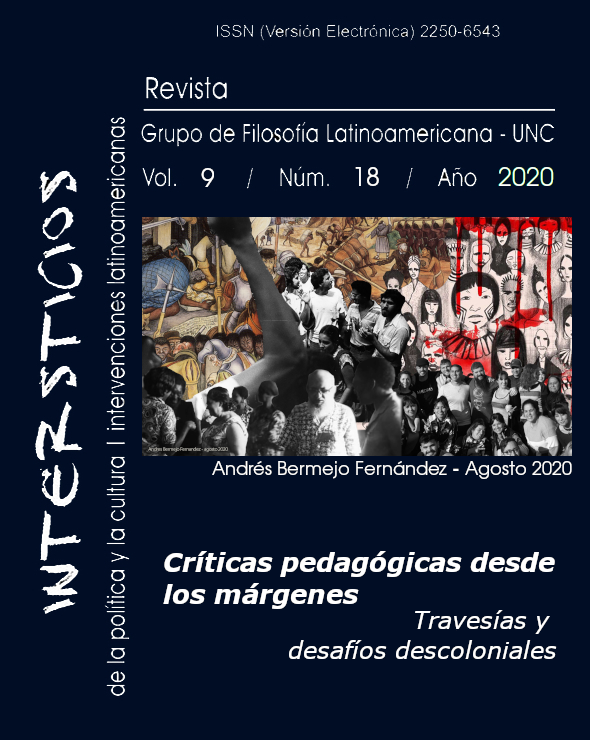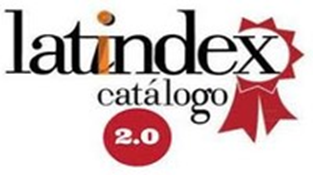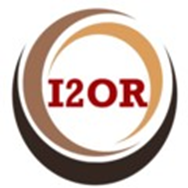Scientific education in teacher training
Epistemological (re)writings from the periphery
Keywords:
Scientific education, Teacher training, Peripheral critical theories, Coloniality, Philosophy of ScienceAbstract
In this article, I carry out an epistemological analysis of the curricular guidelines that, in the last twenty years, normalized the area of scientific education for Primary Education Teachers (PEP), a career offered in teacher training institutions dependent on the Government of the Autonomous City of Buenos Aires (GCABA). First, I present the curricular documents for the PEP-GCABA. In the second place, I show that the guidelines established for our area of work by such documents have certain common epistemological bases. For this purpose: a) I establish some lines of continuity among the guidelines from the notions of science they present; and b) I identify the origin of such notions by tracing their specific genealogies, going back to certain currents and productions of the last decades of the 20th century framed in the Anglo-Saxon tradition in philosophy of science, one of the hegemonic traditions of the North Atlantic. Thirdly, by referring to some of the theoretical-critical currents and productions that in the first decades of the 21st century contributed to energize the epistemological field, I present certain contributions from peripheral critical theories; particularly, I refer to contributions that recognize the geopolitical and situated character of thought and knowledge and that critically assume the logics of the coloniality of power-knowledge. Fourthly, I analyze the guidelines presented by pointing out that, in epistemological terms, they are located within the theoretical framework offered by those Anglo-Saxon currents and productions, while at the same time they tend to make their own epistemological affiliation invisible. Likewise, I indicate that, although these documents affirm the situated character of science, they do not assume an enunciation from the peripheries or from colonial difference. In this sense, following the theoretical-critical contributions mentioned, I emphasize that the guidelines tend to be situated in a differential place of enunciation marked by coloniality.
Downloads
References
Adúriz-Bravo, A. (2001). Integración de la epis¬temología en la formación del profesorado de cien¬cias. Tesis doctoral. Bellaterra, Servei de Publicacions de la Universitat Autónoma de Barcelona.
Chalmers, A. (1991). ¿Qué es esa cosa llamada ciencia? Una valoración de la naturaleza y el estatuto de la ciencia y sus métodos. - 2da ed., revisada y ampliada - España: Ed. Siglos XXI.
Castro-Gómez, S. (2005). La hybris del punto cero. Ciencia, raza e Ilustración en la Nueva Granada (1750-1816). Bogotá: Editorial Pontificia Universidad Javeriana.
Dussel, E. (1994). 1492. El encubrimiento del otro. Hacia el origen del “mito de la Modernidad”. UMSA. Facultad de Humanidades y Ciencias de la Educación. La Paz: Plural Editores.
Díez, J.; Lorenzano, P. (2002). La concepción estructuralista en el contexto de la filosofía de la ciencia del siglo XX. En: Díez, J. y Lorenzano, P. (edit.). “Desarrollos actuales de la metateoría estructuralista: problemas y discusiones”. Buenos Aires: Universidad de Quilmes.
Fernández Mouján, I. (2013). Redefinición de los alcances de la pedagogía de la liberación en sus dimensiones ética, política y cultural. −1ra. ed. − Viedma: Universidad Nacional de Río Negro. Recuperado de:
https://rid.unrn.edu.ar/bitstream/20.500.12049/84/1/moujan_nhorizontes_unrn.pdf
—— (2017). Prólogo al Dossier “Dislocamientos e interrupciones: pedagogías descoloniales”. Estudios de Filosofía Práctica e Historia de la Ideas. Revista en línea del Grupo de Investigación de Filosofía Práctica e Historia de las Ideas / INCIHUSA – CONICET / Mendoza, (19), 1–5. Recuperado de:
https://dialnet.unirioja.es/servlet/articulo?codigo=6697217
—— (2019). Paulo Freire en Argentina y sus legados en la educación popular. Cadernos Prolam/USP, Vol. 19, N. 35, pp. 77-97. Recuperado de:
http://www.revistas.usp.br/prolam/article/view/163842/160213
Glavich, E. et. al. (1997). Notas introductorias a la filosofía de la ciencia. La tradición anglosajona. – 1ra. ed. - Buenos Aires: Oficina de publicaciones del CBC (UBA).
Grüner, E. (2016). Teoría crítica y contra-Modernidad. En: Gandarilla, J. (comp.). “La crítica en el margen. Hacia una cartografía conceptual para rediscutir la Modernidad” (19-60). México: Akal.
Institutos de Formación Docente, Ministerio de Educación del GCABA. (2015). Plan Curricular Institucional para la Formación Docente del Profesorado de Educación Primaria de la CABA. Anexo Res. Nro. 532/SSGECP/15. Buenos Aires: Min. de Educ. del GCABA. Recuperado de:
https://documentosboletinoficial.buenosaires.gob.ar/publico/PE-RES-MEGC-SSGECP-532-15-ANX.pdf
López, A. (2009). La Virgen, el Árbol y la Serpiente. Cielos e identidades en comunidades mocovíes del Chaco. (Tesis doctoral). Facultad de Filosofía y Letras, Universidad de Buenos Aires.
Maimone, M.; Edelstein, P. (2004). Didáctica e identidades culturales. Acerca de la dignidad en el proceso educativo. – 1ra. ed. - Buenos Aires: Ed. Stella-La Crujía.
Mignolo, W. (2002). Geopolítica del conocimiento y diferencia colonial. Traducción del artículo “Geopolitics of knowledge and colonial difference”. The South Atlantic Quarterly, (101), pp. 57–96.
—— (2003). Historias locales / diseños globales: colonialidad, conocimientos subalternos y pensamiento fronterizo. Madrid: Akal.
—— (2015). Habitar la frontera. Sentir y pensar la descolonialidad (Antología, 1999-2014). - 1ra. ed. (esp.) - España: Edicions Bellaterra.
Ministerio de Educación del Gobierno de la Ciudad Autónoma de Buenos Aires (2009). Diseño Curricular Jurisdiccional para la Formación Docente del Profesorado de Educación Primaria de la CABA. Anexo Res. Nro. 6635-MEGC/09. Buenos Aires: Min. de Educ. del GCABA. Recuperado de:
https://documentosboletinoficial.buenosaires.gob.ar/publico/20100611ax.pdf
—— (2014). Diseño Curricular Jurisdiccional para la Formación Docente del Profesorado de Educación Primaria de la CABA. Buenos Aires: Min. de Educ. del GCABA. Anexo Res. Nro. 2514-MEGC/14. Recuperado de:
https://documentosboletinoficial.buenosaires.gob.ar/publico/20140630ax.pdf
Palma, H. (2008). Filosofía de las Ciencias. Temas y problemas. – 1ra. ed. - San Martín: UNSAMedita.
—— (2015). La epistemología evolucionista popperiana. Redefinición del modelo de ciencia sin sujeto. – 1a ed. – Buenos Aires: El autor.
Palma, H.; Wolovelsky, E. (2001). Imágenes de la racionalidad científica. – 1ra. ed. – Buenos Aires: Ed. Eudeba.
Popper, K. (1972). Conocimiento Objetivo. Madrid: Tecnos.
Quijano, A. (1992). Colonialidad y modernidad/racionalidad. Perú Indígena. Vol. 13, Nro. 29, pp. 11-20.
—— (1993). América Latina en la economía mundial. Problemas del desarrollo. Vol. XXIV, Nro. 95. México: UNAM. Recuperado de:
http://www.revistas.unam.mx/index.php/pde/article/view/32381/29776
—— (2000). Colonialidad del poder, eurocentrismo y América Latina. En: Lander, E. (comp.). “La colonialidad del saber: eurocentrismo y ciencias sociales. Perspectivas latinoamericanas”. Buenos Aires, Argentina: CLACSO/UNESCO. Recuperado de:
http://bibliotecavirtual.clacso.org.ar/clacso/sur-sur/20100708034410/lander.pdf
Quine, W. (1969). Ontological relativity and other essays. Nueva York: Columbia University Press.
Secretaría de Educación del Gobierno de la Ciudad Autónoma de Buenos Aires. (2001). Aportes para el debate curricular. Trayecto de Formación Centrado en la Enseñanza en el Nivel Primario. Materia: Enseñanza de las Ciencias naturales 1 y 2. Buenos Aires: Sec. de Educ. del GCABA. Recuperado de:
https://buenosaires.gob.ar/areas/educacion/curricula/fdpdf/mcn1y2npweb.pdf
Walsh, C. (2001). Entrevista a Walter Mignolo sobre "Las geopolíticas del conocimiento en relación a América Latina”. Comentario Internacional. Revista Del Centro Andino De Estudios Internacionales, (2), pp. 49-64. Recuperado de: https://revistas.uasb.edu.ec/index.php/comentario/article/view/241
—— (2013). Pedagogías decoloniales. Prácticas insurgentes de resistir, (re)existir y (re)vivir. Tomo I. – 1ra. ed. - Ecuador: Ed. Abya-Yala.
Downloads
Published
Issue
Section
License

This work is licensed under a Creative Commons Attribution-NonCommercial-ShareAlike 4.0 International License.
Authors who have publications with this journal agree to the following terms:
a. Authors will retain their copyright and grant the journal the right of first publication of their work, which will simultaneously be subject to the Creative Commons Attribution License that allows third parties to share the work as long as its author and first publication in this journal are indicated.
b. Authors may adopt other non-exclusive license agreements for distribution of the published version of the work (e.g., deposit it in an institutional telematic archive or publish it in a monographic volume) as long as the initial publication in this journal is indicated.
c. Authors are allowed and encouraged to disseminate their work through the Internet (e.g., in institutional telematic archives or on their web page) after the publication process, which may produce interesting exchanges and increase citations of the published work (see The effect of open access).











